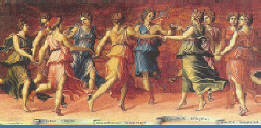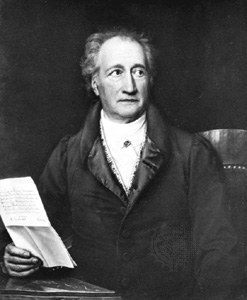|
|
Goethe was born in Frankfurt to a prosperous middle class professional family and received
a rounded private education. He developed a passion for drawing and literature but was
sent to Leipzig for law studies at age 16. His interest in writing, however, led to
publication of his early poetry but also to the neglect of his studies.
After a period of illness at home, he resumed studies at Strasbourg where his poetic
interests revived. He practised with little acclaim as a junior lawyer and, after some
editorial experience, he published Götz von Berlichingen followed by the hugely successful
Die Leiden des Jungen Werther. He was a strong exponent of the restless Sturm und Drang
literary movement.
He was subsequently invited to Weimar as advisor to the younger Grand Duke of
Saxe-Weimar-Eisenach and remained in various governmental positions throughout his
life becoming ennobled in 1782.
His travels to Italy 1786- 1788 revived his interest in classical history and architecture
and became the basis of his Italian Journey published in 1816. After his return to Weimar,
he enjoyed a friendship from 1794 with Friedrich Schiller until the latter's death in 1805. In 1806 he married Christiane Vulpius, his mistress of 18 years.
Goethe is regarded as the greatest German writer. His interests extended to art and science
as well as literature. He was author of several works of fiction and poetic dramas,
numerous works of poetry and some scientific papers, notable among which was his theory
of colours. His great masterpiece, Faust, was written between 1782 and 1832, Part I
being published in 1808 and Part II being finished shortly before his death.
|

